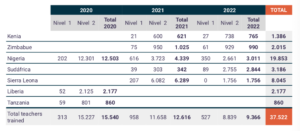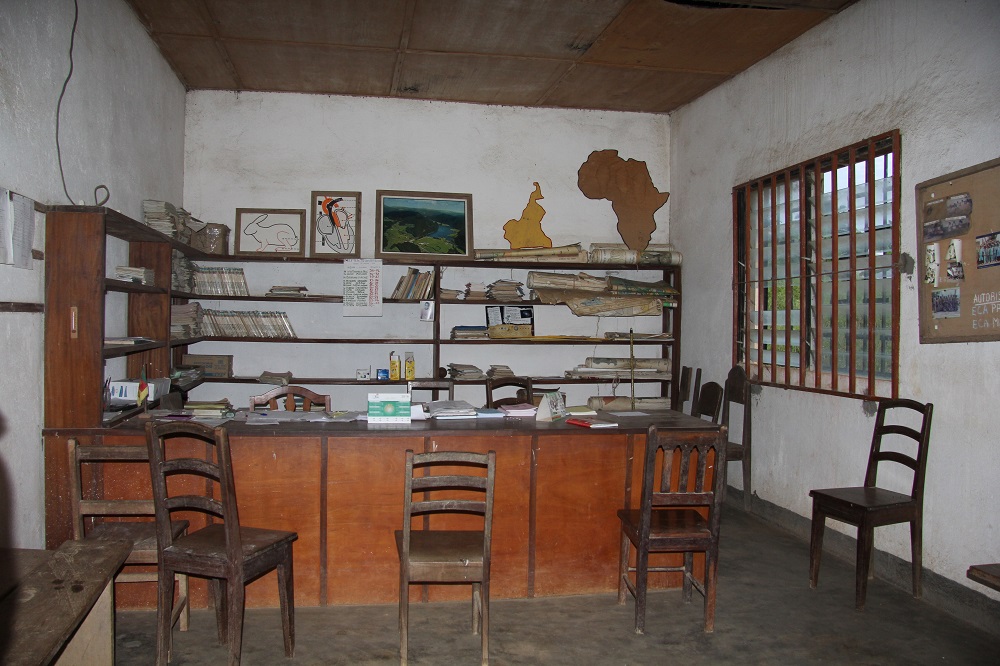16 Million Teachers to Ensure Quality Education in Africa
This undeniable truth, as highlighted by the CEO of Teach for Nigeria in a recent post, is particularly relevant in Africa where the standard of teaching is alarmingly low. Teachers, who are often inadequately qualified, lack motivation, receive meager compensation, and are inadequately respected and valued, are faced with the daunting task of educating students in overcrowded classrooms plagued by pervasive poverty and inequality.
According to UNESCO, the achievement of the goals outlined in the 2030 Agenda necessitates an additional 5.4 million teachers at the primary level and 11.1 million at the secondary level in sub-Saharan Africa.
Amidst this challenging landscape, cascade training has emerged as a promising strategy to invigorate the professional growth of educators in Africa and positively impact students’ educational experiences.
In this article, we will delve into the fundamental principles of cascade training, explore the successful implementation of this approach by ProFuturo in collaboration with the esteemed organization Teach for All Network Partners, and draw valuable insights from this transformative experience.
According to UNESCO, the achievement of the goals outlined in the 2030 Agenda necessitates an additional 5.4 million teachers at the primary level and 11.1 million at the secondary level in sub-Saharan Africa.
Cascade Training: An Effective Strategy for Teacher Professional Development

Picture credit: Teach for Nigeria
Cascade training is an approach that involves the transmission of knowledge and skills from a group of trained trainers to a larger group of teachers. This strategy is rooted in the belief that teachers can learn effectively from their peers through collaboration, making it a valuable form of professional development.
How does it work? The cascade training process begins with the selection of highly skilled trainers who acquire new knowledge and skills to pass on to their peers. Once the trainers have gained the necessary expertise, the cascade phase commences. During this stage, the trainers share their knowledge with a broader group of teachers, which may include colleagues from the same school, region, or even the entire country.
ProFuturo and Teacher Training in Africa
The ProFuturo Foundation strongly recognizes the influential role of teachers as catalysts for educational transformation. In collaboration with the Teach for All Network Partners, they initiated the Teacher Professional Development project in 2020. The project aims to empower teachers as change agents within their educational communities, combining cascade training, technology, and digital education.
This initiative has been successfully implemented in seven sub-Saharan African countries: Kenya, Sierra Leone, South Africa, Zimbabwe, Nigeria, Tanzania, and Liberia. Over the course of three years, a remarkable 37,522 teachers have received training.

The multiplying power of cascade training.
To assess the effectiveness and applicability of this training and derive valuable insights for future projects utilizing similar methodologies and approaches, ProFuturo and Empieza por Educar have prepared a comprehensive report. This report not only presents the outcomes achieved over the past year but also consolidates the project’s conclusions, lessons learned, and best practices.
Cascade training is an approach that involves the transmission of knowledge and skills from a group of trained trainers to a larger group of teachers.
Cascade Teacher Training: A Catalyst for Transformation
In the following sections, we will delve into the valuable lessons learned throughout the three-year implementation of this project.
Efficiency of the Cascade Training Model
Cascade training proves to be an efficient approach, enabling the optimal utilization of resources. Instead of individually training each teacher, the model facilitates training in larger groups, leading to cost reduction and maximizing the training’s reach.
The cascade training model implemented in this project involves two types of teachers. Firstly, Level 1 teachers, who undergo direct training from the local counterpart team following the Teach for All methodology. These teachers actively participate in the development programs of the local counterparts (fellows). Secondly, Level 2 teachers, who are established educators within their schools and integrated into the local education system, receive training from Level 1 teachers using materials jointly developed by Empieza por Educar (Teach for All in Spain) and ProFuturo. This approach empowers local counterparts and Level 1 teachers, fostering the development of their own teacher training skills.
This generates a multiplier effect, enabling the training to reach numerous teachers across diverse locations and contexts. Specifically, throughout the three-year project implementation, an impressive 37,522 teachers were trained, comprising 1,789 Level 1 teachers and 37,209 Level 2 teachers.
Flexible, Relevant, and Context-Specific Training
The trainers responsible for delivering the training are practicing teachers who possess an intimate understanding of the specific challenges and needs that arise within the classroom. This unique perspective allows them to adapt the content and teaching strategies to suit the realities and demands of the educational environment in which the participating teachers operate.
In this particular case, the training program is comprehensive, encompassing the key pillars for effective and tailored instruction at any educational stage. It consists of five mandatory modules, focusing on vision and lesson planning, classroom culture and management, as well as comprehension verification. These modules have a minimum total duration of 15 hours. Additionally, there are four optional modules that local partners can incorporate into their training, addressing specific areas that are most pertinent to their particular context.
When assessing the satisfaction level of participants with the training they received, it is noteworthy that over 88% believe that it has significantly contributed to their development of various skills and knowledge, ultimately enabling them to become better educators. Moreover, there is a high perception of the training’s relevance and usefulness, with 80% of teachers recognizing the significance of the content covered.
Ensuring Quality Pedagogical Materials and Up-to-Date Resources
A comprehensive range of pedagogical materials has been developed, including textbooks that encompass all the necessary theoretical information, infographics that succinctly summarize each module, and informative digital presentations. These analog and digital resources have been tailored to local educational contexts, addressing specific gaps in areas that are central to the current development of educational innovation. Key areas covered include digital competencies, classroom management, and fostering positive relationships with students.
Ensuring Quality Trainers
One of the fundamental challenges in cascade training is to ensure that the selected trainers are highly skilled experts who possess the necessary abilities to effectively transmit knowledge and teaching strategies. In this particular case, the results pertaining to trainer satisfaction, accessibility, clarity of explanations, and subject matter expertise are consistently high across the board. Over 88% of participants felt that their trainer was accessible, more than 87% believed their trainer provided clear explanations, and over 79% acknowledged their trainer’s rigorous knowledge of the subject matter.
Fostering Peer-to-Peer Collaboration Networks
This approach encourages collaboration and the exchange of ideas among teachers, facilitating continuous learning and professional development. In this case, working alongside fellow teachers proved to be a positive experience for all participants. The opportunity to share reflections, address doubts, and propose new ideas and methodologies greatly contributed to their growth and development.
Providing Ongoing Follow-Up and Support for Teachers
Following training, it is crucial to provide teachers with ongoing follow-up and support to ensure the practical application of their newly acquired knowledge in their daily practice. Without proper follow-up, teachers may experience demotivation or encounter difficulties in implementing the learned strategies. Establishing support mechanisms such as counseling, classroom observations, or collaborative spaces for resolving doubts and sharing experiences becomes essential in maintaining teacher growth and success.
Revitalizing Motivation
The demands of teaching often overshadow the true calling of educators. However, this training program has successfully rekindled teachers’ passion for their profession, reigniting their enthusiasm and reintroducing forgotten methodologies.
Synergistic Collaborations: Public-Private-Civil Society
The program has served as a vital platform for fostering connections between local partners, government representatives at various levels, and other stakeholders in the education sector. This collaboration has expanded the network and enabled the organization to reach more teachers and schools.
This teacher professional development program exemplifies the transformative power of cascade training in bolstering education in Africa and other vulnerable environments. By delivering effective, context-specific, and collaborative training, it enhances the quality of teaching and learning. Although challenges remain, such as limited connectivity and infrastructure, as well as the implementation of monitoring and evaluation tools, a comprehensive approach and unwavering commitment involving government authorities, civil society, and private organizations can drive significant educational development in Africa and other vulnerable contexts. Ultimately, this empowers teachers to become agents of change within their communities.






